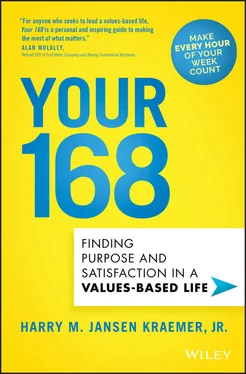The second part is “The Balancing Action Plan.” In this part, we move from what defines a balanced life to putting an action plan in place to create greater balance. We explore six life buckets and how people at all phases and stages devote time and energy to each of these buckets:
Work and career (with the pursuit of balance in real time). For most of us, work is very important and must get done. However, today more than ever, it's possible to use technology and flexible arrangements to make working part of your life. In this chapter, we'll also discuss how to tackle two buckets at once—not as a rule, but strategically. This is all about investing your 168 in ways that work for you.
Family, friends, and community. Our lives are enriched by the people who matter most to us. For many, this means family and friends, but it can also include support groups and community organizations. By choosing whom we spend time with, when, and for how long, we can build meaningful and supportive communities for ourselves.
Health. One of the most common desires I hear is to “be healthier”—and one of the common complaints is “I don't have time for it.” But we know that health directly affects quality of life, which means health goals for most people are a priority in their 168.
Fun. Life needs fun. Too often, though, fun seems like the last priority for people, and without planning for fun, it can get overlooked.
Faith and spirituality. For many people, having a life bucket for faith and spirituality is critically important. It reinforces self-reflection and embraces one's purpose at a deeper level.
Making a difference. Many of us want to make a positive impact—big or small. For some, it's in the local community; for others, it's global. In your own way, you can allocate your 168 in a way that creates a legacy.
No one's life is in balance all the time. We are all works in progress, constantly refining ourselves through self-reflection and becoming more self-aware. As we become more aware of our values and of how we spend our time, however, we move closer to the goal of leading a values-based life.
We're each given 168 hours a week. It's up to us to spend them in a way that matters most.
SECTION ONE DEFINING BALANCE
CHAPTER 1 BECOMING SELF-AWARE
To live a values-based life, you need to know what your values are. Then, you make a sincere and ongoing effort to live your life so that what you do and how you act reflect those values. Sounds pretty straightforward, doesn't it? But notice I said, “sincere and ongoing effort.” The reality is no matter how dedicated you are to living a values-based life, you're always a work in progress. Nobody gets it right all the time. In my more than 40 years of pursuing a values-based life, I'm constantly recalibrating how to allocate my 168 hours each week to reflect my values and what I believe is most important in my life. That's the only way I know of to pursue life balance.
Life balance, as I explained in the introduction, doesn't mean work-life balance—a concept that always confused me because it seems to indicate a choice between working and living. Our lives are multifaceted. Many of us devote a great deal of time to work—let's hope, doing work we find meaningful and satisfying. But there is more to our lives than work. We have other priorities that might include family, friends, and/or others within our community. We have leisure activities that bring enjoyment and enrich our lives. We want to be healthy and pursue some kind of exercise. Spirituality may be important, and maybe we want to make a positive impact in the community or even globally.
Don't mistake life balance for time management. The primary goal here is not to become incredibly efficient with your time, although that might be one of the benefits of engaging in this process. The primary goal is life balance. It comes down to the life buckets I discussed in the introduction, the specific areas into which we allocate our time, attention, and effort. By focusing on our chosen life buckets, we can pursue life balance—with the caveat that we won't be in balance all the time. Rather, we'll be constantly recalibrating and rebalancing.
The only way to pursue life balance is by becoming self-aware through self-reflection. Your commitment to living your life aligned with your values won't always be easy. Countless demands, distractions, and unexpected challenges will get in the way. But the payoff for engaging in the pursuit of life balance is to have more joy, satisfaction, purpose, and meaning, with a lot less worry, fear, anxiety, pressure, and stress.
Whenever I talk about life balance, most people are very intrigued. They ask whether it is really even possible to be self-reflective in the crazy, nonstop world in which we live. I always tell people that a large part of the problem is that most of us are attempting to do three to four times the number of things that is humanly possible. We tell ourselves we'll “make time” as if we can somehow manufacture more hours in the day or week. (Sorry, but there are only 168 hours in the week for everybody.) We want to be conscientious and get as much done as possible, so we tell ourselves we'll just go faster. What other choice is there given all we have to do? So that brings us to our old friend, multitasking. We convince ourselves that if we can do two (or more) things at the same time, we'll get twice as many (or more) things done!
Our smartphones and other devices are supposed to make us more productive. We're connected all the time and everywhere. But it's getting out of control. It's one thing to do a call while you're driving, but quite another to do email and texts at red lights—or when traffic slows to a crawl. You'll soon drive yourself crazy, not to mention potentially become a hazard on the road.
At some point, you have to ask yourself: are you really more productive or just more active? Have you confused activity for productivity? If you're moving so fast, however, you won't have any idea how productive you are—and you'll just keep moving.
That's when you need to take some time, step back, and self-reflect. What are you spending your time on? How does that match with what you say is most important in your life? That's the only way to cut through the activity and get to productivity so you can pursue a balanced life. If you want life balance, you need self-reflection.
EMBRACING SELF-REFLECTION
“Wait a minute, Harry, I don't have time for that!” Be honest: was that your first response? Trust me, after more than 15 years of teaching and giving talks on values-based leadership, I hear this all the time. “Sounds great, but I don't have time for that. I'm traveling half the time, my to-do list is eight miles long, and everybody in my life wants more of me.”
When people say that, I cannot help but wonder if it's really an issue of not having the time (we're talking about 15 minutes a day) or if this is just something they don't want to do. If people were really honest with themselves, maybe the reason they don't want to self-reflect is they don't want to confront the truth that there is a very big difference between what they say is important and how they allocate their 168 hours. Being self-reflective can get uncomfortable because it's too close to home. So let's address that first: self-reflection isn't about beating yourself up. It's about being truthful with yourself about what is—and is not—a priority for you. There's no judgment here. Your self-reflection is just for you, to pursue more balance in a way that makes the most sense for your life—not someone else's life.
If you want to lead your own life, and not be in a constant state of reacting to others, it makes sense to take some time for self-reflection. This can take as little as 15 minutes—ideally every day, but even once a week is a good start. I've practiced self-reflection since I was in high school, all the way through college and then graduate school; from the earliest days of my career all the way to becoming chief financial officer and then chief executive officer of Baxter International, a $12 billion health care company with 52,000 employees. Today, I teach at Northwestern University's Kellogg School of Management; I'm an executive partner at Madison Dearborn, a private equity firm; I work closely with companies in our portfolio and sit on several boards; and I travel 60 percent of the time, including to give speeches on values-based leadership to people around the globe. And my wife, Julie, and I have been married for 40 years and have five children; my spiritual life is very important to me; I exercise five days a week; and I stay in touch with family and many close friends. Trust me, I know all about being busy. But I also know that, without self-reflection, there would be no way I could pursue balance in all the things that are important to me and live a life that is an authentic reflection of my values.
Читать дальше












